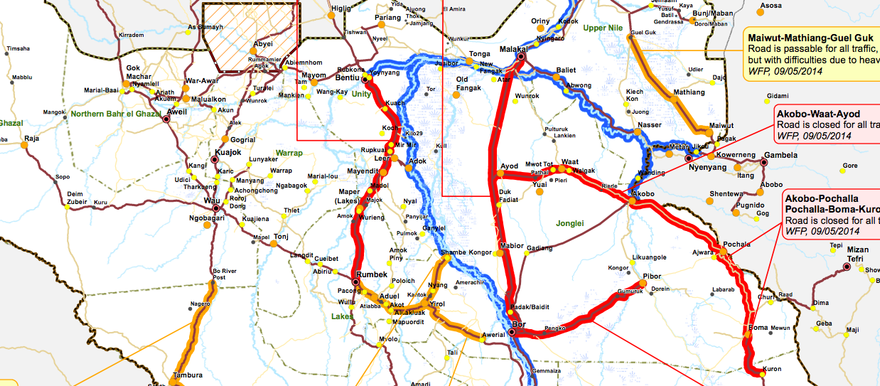World Food Programme and other aid agencies have begun to rely increasingly on airlifts and airdrops as more roads become impassable in South Sudan owing to heavy rains.
Fighting west of Bentiu including around the UN base also affected humanitarian access, causing cancellation of flights. Insecurity also hampered aid efforts in Jonglei, after SPLA launched offensive operations toward Akobo.
Malnutrition continues to rise and aid agencies working in child treatment and feeding programmes say they do not have enough personnel to cope with the situation.
OCHA, the UN humanitarian coordination office, released a situation report on Saturday covering the period 10-16 May. The information below represents a selection of highlights from the report:
Since January, 21,789 children aged 0-59 months were admitted to treatment programmes for severe malnutrition, and 20,556 children for moderate acute malnutrition. This represents an increase of 6,566 severely malnourished children over a one week period since the last OCHA report dated 9 May, with an increase of 1,888 to the number of children with moderate malnutrition.
138 metric tons of humanitarian supplies were airlifted to Old Fangak in Jonglei State, Malakal in Upper Nile State as well as Ganyiel and Yida in Unity State. Food distributions on the ground are also ongoing or planned in Walgak, Lankien and Akobo in Jonglei.
A food barge moved up the Akobo River from Gambella, Ethiopia to Akobo in Jonglei for the first time since the crisis began, delivering 70 metric tons of food.
Engineering works are being undertaken in the overcrowded Malakal PoC site to address flooding, including construction of drainage canals and roads in sector one of the new camp, which will be ready for occupation by the end of May.
Alcohol abuse among some displaced people in the Malakal camp is reportedly affecting the aid operation. NGOs have initiated a dialogue with community leaders to help address the situation.
Aid workers conducted another rapid assessment in Renk County, Upper Nile, visiting Abayok camp, Jalhak and Wontou. About 13,000 people were displaced in Wontou and in need of food, emergency shelter, water, and sanitation and health assistance.
The estimate for the number of people displaced from Nasir and Ulang counties after recent attacks there has risen, with at least 16,000 new arrivals at Burubiey entry point in Ethiopia.
In Ayod County, Jonglei State, a rapid assessment in Jiech, Mogot and Pagil locations, concluded that up to 60,000 people have been displaced, with the majority of them in need of food.
NGOs working in the field of malnutrition treatment say they need more staff to respond to all the cases of malnourished children in UN bases. For example, they have been delayed in establishing a stabilization center in the UN base of Bor due to the absence of staff to manage severe cases of malnutrition.
Map: Road access constraints in South Sudan, with red indicating impassable roads and orange roads passable only with difficulty or to light vehicles only, as of 9 May 2014 (WFP/Logistics Cluster)
Related coverage:
South Sudan crisis: Key humanitarian updates (10 May)




